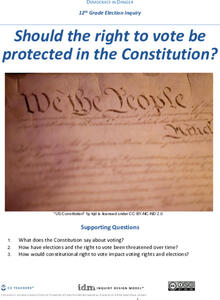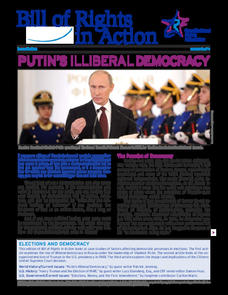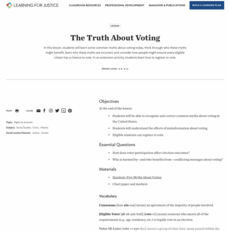C3 Teachers
Democracy in Danger: Should the Right to Vote Be Protected in the Constitution?
High school seniors investigate what national, state and local rules say about voting. After examining the Constitution's articles, clauses, and amendments, researchers look at videos, listen to podcasts, and read articles to gather...
Teaching Tolerance
The True History of Voting Rights
Explore what voting rights really are in an intriguing lesson plan that explores the history of American voting. The resource examines the timeline of voting rights in the United States with group discussions, hands-on-activities, and...
K20 LEARN
Show Me Your Credentials: Voting In America
The debate over voting rights continues. To begin their study of voting rights, class members first vote on proposed new classroom rules. After a discussion of the activity, groups are given a copy of the 1965 Alabama Literacy Test and...
Carolina K-12
How Do I Pre-Register and Vote in North Carolina?
Did you know that in some states your pupils can pre-register to vote? Teach the advantages to pre-registering and engage the classroom in an intriguing discussion about youth voting trends. Class members participates in a live polling...
Deliberating in a Democracy
Voting
Young scholars read about voting rights and compulsory voting in democracies. For this voting rights lesson plan, young scholars analyze the reasons for supporting and opposing compulsory voting and discuss whether compulsory voting is...
Teaching for Change
A Documents-Based Lesson on the Voting Rights Act
How did the Voting Rights Act affect the daily lives of American citizens? A document-based lesson developed by the Student Non-Violent Coordinating committee (SNCC) presents a case study of the impact of the Voting Rights Act of 1965 on...
Constitutional Rights Foundation
Why Don’t More People in the U.S. Vote?
To vote or not to vote, that is the question. Secondary scholars explore voter turnout in the United States. The resource uses informational text, group discussion, and a worksheet to help academics understand hindrances to voting and...
Constitutional Rights Foundation
Suppressing the Vote
Voting rights have expanded over time, but some voters are still being suppressed. A thought-provoking resource explores the history of voter suppression in the US and efforts to remove roadblocks to voting. Young historians learn about...
Teaching Tolerance
Voting in Your Town
A socially important resource focuses on voter turnout and roadblocks to voting. Scholars review resources on voting stats, watch a documentary, and participate in group discussion regarding voting in their local communities. Academics...
DocsTeach
Analyzing a Letter About American Indian Voting Rights
An informative activity focuses on the law preventing Native Americans from voting until 1947. Scholars read documents from the Office of Indian Affairs, complete an online worksheet, and participate in group discussion. Academics learn...
Carolina K-12
Compulsory Voting
Should voting in the United States be compulsory? In 2004, fewer than 60 percent of eligible voters cast ballots in the American national elections. After reviewing arguments for and against compulsory voting, your young citizens will...
Classroom Law Project
What does the Constitution say about voting? Constitutional Amendments and the Electoral College
As part of a study of voting rights in the US, class members examine Constitutional amendments connected with voting and the role of the Electoral College in the election process.
BBC
Local Democracy
Expanding our students' understanding of government at a local level is a great way to build an understanding of government at a global level. Start the understanding by using any of these fun teaching ideas. Learners engage in several...
Curated OER
Why Vote? A Public Awareness Campaign
Young scholars examine the structure of local government and determine why citizens vote. In this civics instructional activity, students listen to a lecture about the structure of local government and then encourage others to exercise...
Curated OER
Race and Voting in the Segregated South
High schoolers examine the history of African American voting rights. In this voting rights lesson, students listen to a lecture on African American voting rights between the years 1890 and 1965. High schoolers respond to discussion...
Constitutional Rights Foundation
Putin's Illiberal Democracy
Is Russia really a democracy? High school scholars explore Russian democracy under the leadership of President Putin. The resource provides opportunity for group discussion, writing, and research to understand Russia's political history,...
Facing History and Ourselves
The Audacity of a Vote: Susan B. Anthony’s Arrest
Susan B. Anthony's speech "Is It a Crime for Women to Vote?" takes center stage in a lesson that asks class members to consider how they might respond to what they consider an unjust law. Groups work through the speech paragraph by...
Annenberg Foundation
Electoral Politics
You won't just get a lesson when you click on this resource. As you click on the related resources located to the left of the screen, you'll find, a professional development video, teacher/student notes, lesson plan, and related reading...
Teaching Tolerance
The Truth About Voting
True or False: Only Presidential elections matter. Academics delve into common voting myths to understand what is true and why the election process is critical to democracy. The lesson uses group discussion, activities, and handouts to...
Facing History and Ourselves
Interracial Democracy
Radical Reconstruction, the 10-year period referred to after Congress passed the Reconstruction Act of 1867, saw the establishment of manhood suffrage, men voting without any racial qualifications. Southern states also rewrote their...
Curated OER
Using Bar Graphs to Understand Voting Patterns
Bar graphs are used as a way to study voting patterns in the United States. A variety of statistical data is presented in the graphs, and pupils must interpret the data in order to make a report to the class. Three excellent graphs,...
Kids Voting USA
Kids Voting USA: K-2 Classroom Activities
Address both social studies and critical reading skills with a resource dedicated to the voting process, the American democracy, and the ability to evaluate information in order to develop a stance on an issue. Each themed activity set...
Indiana Department of Education
Voting: It's Not a Spectator Sport!
Why is it important to vote? Who is eligible to vote? Why is it that some eligible voters do not vote? Class members conduct interviews with adults and other school mates before researching the eligibility requirements for their state,...
Curated OER
What is a Democracy?
Learners identify what makes a country democratic and compare United States and Indian political party symbols. They create their own political party and party symbol. They create a campaign speech, participate in the voting process...

























